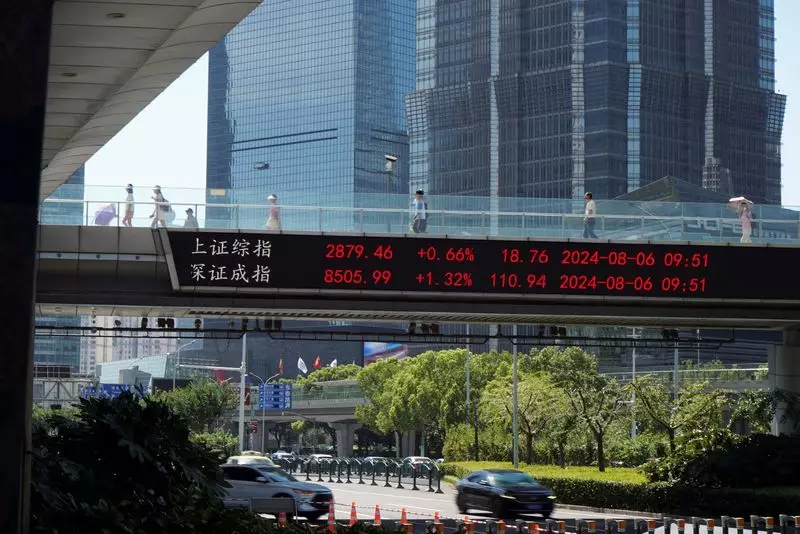As we venture into a new trading week in Asia, investors are left contemplating a mixed bag of recent global economic indicators. From promising signs on Wall Street to troubling data from China, the mood in the markets is decidedly cautious. The conflicting signals can create a challenging environment for traders who are looking for clarity in a world seemingly beset by economic uncertainty.
In stark contrast to the Asian economic indicators, the U.S. stock market has experienced one of its most robust weeks in 2021. With a significant uptick driven by renewed hopes that the Federal Reserve will kick off its interest rate-cutting cycle with a substantial 50-basis-point cut, sentiment has turned markedly positive. The S&P 500 recently reached a staggering proximity to its all-time high, just shy of 1%, demonstrating the resilience and optimistic outlook of U.S. investors. Additionally, with the Nasdaq making impressive gains of 6%—its best performance since October—the enthusiasm seems to be buoying expectations across the Pacific, even as Asian markets grapple with their own set of challenges.
With the backdrop of U.S. gains, Asian markets find themselves caught in the whirlwind of disappointing data emerging from China. For many investors, particularly those in hedge funds and high-risk profiles, China currently resembles a conundrum: a market steeped in risk but potentially ripe for rewarding opportunities. Despite a drop of around 15% in stocks over recent months, the allure of underselling valuations presents a tantalizing prospect for those willing to venture into turbulence. However, the broader economic picture remains grim, accentuated by deflationary pressures and an increasingly murky growth outlook.
The Chinese economy is witnessing a steady trickle of negative indicators, with the latest data suggesting that a robust recovery is further away than previously anticipated. Home prices, for example, have plunged at their steepest rate in nearly a decade, indicating significant distress in the real estate market. Industrial output growth has also shown signs of fatigue, hitting a five-month low, while foreign direct investment has tumbled by 31.5%, a worrisome trend for the global perception of China as an investment haven.
Amid these troubling trends, Beijing’s reaction—or lack thereof—to the economic malaise raises further questions. Authorities seem reluctant to unleash the necessary stimulus or policy measures to kickstart the economy effectively. Instead, the emphasis is placed on maintaining control over capital flows, as outflows continue to escalate and inflows practically dry up. The Chinese yuan, which has shown signs of recovery recently, is one aspect of the economy that appears more tightly managed under the supervision of the central bank. While the yuan’s strengthening may indicate some level of confidence, the broader indicators of economic health tell a more turbulent story.
With the Biden administration imposing steep tariff hikes on Chinese imports—including a staggering 100% duty on electric vehicles—the trade relationship further complicates an already precarious situation. This move invites retaliation from China, which has expressed its intention to take “necessary measures to resolutely defend the interests of Chinese companies.” As tensions rise, so does volatility, creating a precarious atmosphere for Asian markets ahead of crucial monetary policy decisions and inflation data releases later in the week.
Investors will undoubtedly remain vigilant as they navigate this tumultuous landscape. The upcoming week holds significant importance as key monetary policy decisions are scheduled from major players such as Indonesia, Taiwan, China, and the Bank of Japan. Furthermore, inflation data releases from Japan and Hong Kong will add layers of complexity to the investment narrative in the region.
As Asian markets prepare to open on Monday, the juxtaposition of Wall Street’s optimism against China’s unsettling economic performance sets the stage for a week of potential volatility. The mood among traders and investors will likely hinge on the convergence of U.S. economic decisions, Asian monetary policies, and the enigma that is China’s current economic environment. With all eyes on these developing narratives, it remains to be seen whether Asia can counterbalance the groundswell from Wall Street or will continue to grapple with its own disconnect.

